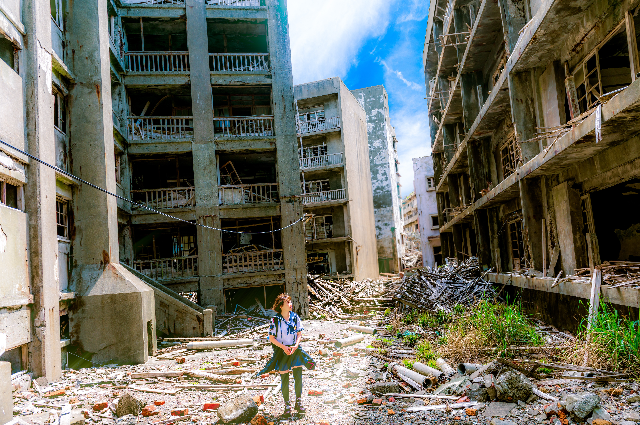
The thick, humid darkness of the night blanketed the peacefully sleeping city. I could hear crickets chirping far away and dogs barking even further. Lying next to Grandma, I kept tossing and turning in bed. I stared at my Grandma's sleeping face next to mine. A sheet of silver moonlight, filtering through the windowpanes, fell on her creased, loose skin. Small crinkles radiated from the edges of her eyes. Her forehead had three well-defined lines like someone had drawn them with a ruler. She didn't have those lines in the photographs I had seen of her when she was younger. Before the war. Before the dreadful scenes had unfolded before her eyes.
Grandma doesn't remember much about the war. Or at least that's what she says. Her most vivid memories, she says, are those from her girlhood. She talks about a cozy house with a breathtaking garden sprawled out in front of it. All kinds of flowers used to grow there, but especially bouganville. That was her favorite too. She took special care growing them like they were her babies. The sky used to be a peculiar hue of violet where she lived. Grandma claims she never witnessed a sky as beautiful again. She and her siblings used to play out in the streets, shouting and giggling, while their mother would prepare their meal for the day. Every day was the same and yet not the same because when you are a child, safe and protected in the loving arms of your family, the world feels like your oyster. She grew up to be a lovely young lady, polite and delicate, as the women those days used to be. It was only a matter of time until she met a guy, fell in love and got married. When she reminisces this phase of her life, she gets transported to some other dimension, a plane of existence where none of us can reach. Then came the time she had a baby. Her daughter. My mother.
They say my mother was born the day war was declared.
And that is where it all changed.
Suddenly, home wasn't home anymore. It was the mouth of death. They say what you love the most kills you. And that is exactly what their homeland turned out to be for them. A death sentence.
Within the next few days, the skies saw, in horror, the missiles and bombs dropping onto the city below, the bright violet colour fading away. War sirens rung in the whole city, and citizens were asked to evacuate. Grandma and her husband decided to leave with their newborn. They took nothing with them. And they left off for a place unknown, strange yet hoping for it to be a safe haven for them. Before leaving, she saw the house that she had grown up in, fallen down into a rubble, the garden nowhere in existence. And with that her innocent childhood memories were tainted with the ugly stain of war. She saw people in their worst forms - terrified, wailing, desperate, wounded, dead.
The story stops here every time she recounts it. She says she can't recount further how they escaped and reached this safe city that became their new home. I don't know if she really doesn't remember it or whether she doesn't want to. Either way, the war left an impression on her life so significant, that you can still see in her eyes how terrified she is of mankind. Perhaps that's why, she always takes solace in solitude.
I stared at her as the muscles on the side of her mouth twitched. My heart filled with a dull ache as I realised that this frail old woman deserves all the love in the world. I wish this world had been more kind to her. I wish we humans could be as kind to each other as this universe is to us. I wish home was a safe cocoon, not merely a memory of war.
